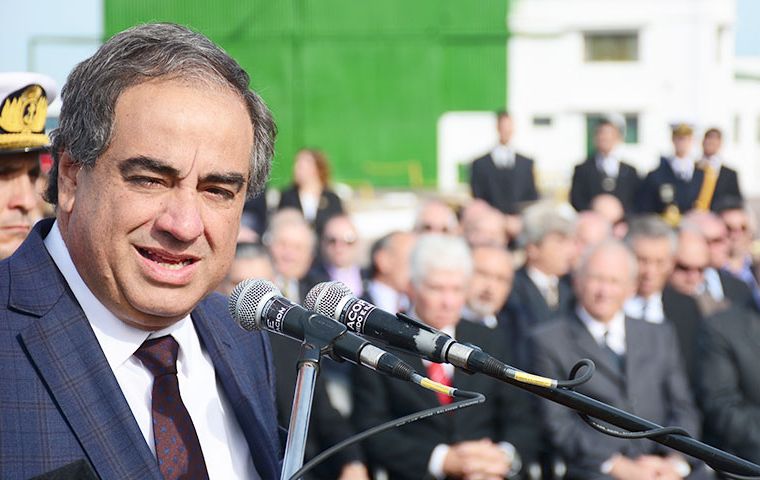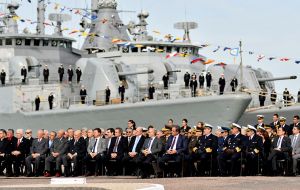MercoPress. South Atlantic News Agency
Argentina paid homage to officers and crew that went down with the cruiser General Belgrano 35 years ago
 Minister Martinez said Malvinas is a matter of state, it is “the inalienable calling of the Argentine sovereignty claim over out Malvinas”, no matter the government.
Minister Martinez said Malvinas is a matter of state, it is “the inalienable calling of the Argentine sovereignty claim over out Malvinas”, no matter the government.  Rear Admiral Galardi honored all those who fought for the recovery of “our Islands and maritime spaces”, a permanent objective until “our flag again flies over the Islands”.
Rear Admiral Galardi honored all those who fought for the recovery of “our Islands and maritime spaces”, a permanent objective until “our flag again flies over the Islands”. Argentina paid homage on Tuesday to the 323 crew and officers who lost their lives when the Navy's cruiser General Belgrano was sunk on 2 May 1982, by a British submersible in the midst of the Falklands conflict 35 years ago.
The main ceremony was in Puerto Belgrano, the Argentine Navy´s main naval base and was headed by Defense minister Julio Martinez. A second event took place at the Libertad building, seat of the Navy in Buenos Aires.
Minister Martinez in his speech said that Malvinas is a matter of state, it is “the inalienable calling of the Argentine sovereignty claim over out Malvinas Islands”, no matter what government.
He added that “those sailors and soldiers who did the utmost sacrifice for their motherland, as well as their courage, solidarity and unity displayed, must be a permanent example for us and for the generations that will succeed us”.
The minister also underlined the attendance of survivors of the sinking, “who thanks to God are here today with us, because they also have given us lessons as to how to continue to advance”.
The ceremony was also attended by the commander of the Navy, Admiral Marcelo Eduardo Hipolito Srur, as well as other government and provincial officials, military personnel and special guests.
In Buenos Aires the chief of naval staff, Rear Admiral Pedro Galardi pledged that the Navy follows on the steps of its predecessors, “prepared to show that we are ready to follow their example whenever the motherland demands it”
Galardi honored all those who fought for the recovery of “our Islands and maritime spaces, which are standing and inalienable objectives of our Nation until our flag again flies over the Islands”.
“We must publicly honor and recognize our fallen comrades for their example, and solemnly express their sacrifice has not been in vain: we are all determined to follow their steps to recover the sovereignty over our austral archipelagos”.
Galardi added that General Belgrano lies in the bottom of the sea, “a monument to our people, a clear and vivid memory of our legitimate rights, and our gone comrades are the standing guards who gave their lives for the motherland”.
Finally the naval officer underlined that in such extreme situation, when the cruiser went down, “men are tested to their utmost and it is when such qualities of leadership, training and discipline emerge, essential attributes of the men and women that make up the Argentine navy”.
During the ceremony government representatives, officers, relatives, Malvinas veterans laid flower wreaths at the monument which honors those who lost their lives during the 1982 conflict.




Top Comments
Disclaimer & comment rules-

-

-

Read all commentsMy paternal grandfather lost his life in the first World Way as a serving Chief Petty Officer in the Royal Navy - his vessel HMS Begonia just disappeared off the northwest coast of Africa in 1918. It is believed that it was sunk by a German submarine.
May 03rd, 2017 - 04:15 pm +6His eldest son, my father, also served in the Royal Navy for over 35 years and I, too, served in the Royal Navy for a while.
It was a sad day for all mariners when the Belgrano was sunk by a British submarine BUT Argentina had provoked this event by invading British territory and the two nations were at war. As stated above, Captain Héctor Bonzo, the commanding officer of the Belgrano, clearly accepted the event as an act of war and NOT a “war crime”, as has been alleged by other Argentine sources and, even, by a prominent British Labour MP(who should have known better!)
Pgerman- No Br soldiers were killed on 2nd April 1982-Agrre, Purely by good luck though- your special forces just happened to firebomb the Br Marine Accomodation block in the night with phosphorous grenades- nasty things they are- the burning phosphor sticks to your body and burns right into your innards.
May 03rd, 2017 - 08:16 pm +6Unknown to the Arg forces the Marines were all out down on the beaches and around Govt House.
Then there was the civilian family who took an Arg mortar bomb in through into their house- luckily they were at the other end inside!
Then later the Arg grenades left under the desk lids and in empty cups in our JUNIOR School?!
So Arg did try to kill lots of us.
One of the reasons we will never forgive nor forget.
Minister Martinez in his speech said that Malvinas is a matter of state, it is “the inalienable calling of the Argentine sovereignty claim over out Malvinas Islands”, no matter what government.
May 03rd, 2017 - 09:19 am +4Usurpation! UN Resolutions!!
Falklands – 1833 Usurpations & UN Resolutions:
https://www.academia.edu/21721198/Falklands_1833_Usurpation_and_UN_Resolutions
Regarding the Belgrano - On May 7th, 1982, Argentina complained to the International Committee of the Red Cross in Geneva which ruled that the vessel, though outside the TEZ, was within the security zone of British ships in the area; was fully armed and engaged in operations and that therefore there was no breach of the Geneva Convention. The action was perfectly legal.
Captain, Héctor Bonzo, when he spoke to the newspaper Clarin in 2007 – “ It was an act of war. The acts of those who are at war, like the submarine’s attack, are not a crime … The crime is the war. We were on the front line and suffered the consequences. On April 30, we were authorised to open fire, and if the submarine had surfaced in front of me I would have opened fire with all our 15 guns until it sank.” (falklandsnews.wordpress.com/2013/05/03)
Commenting for this story is now closed.
If you have a Facebook account, become a fan and comment on our Facebook Page!